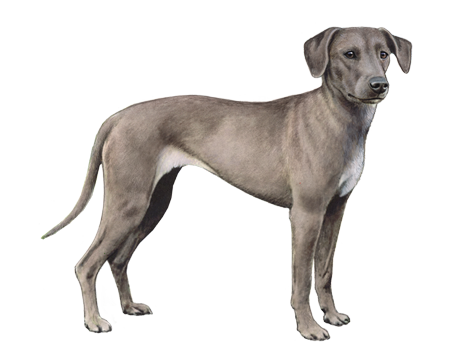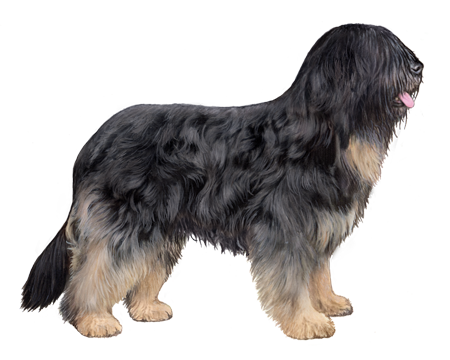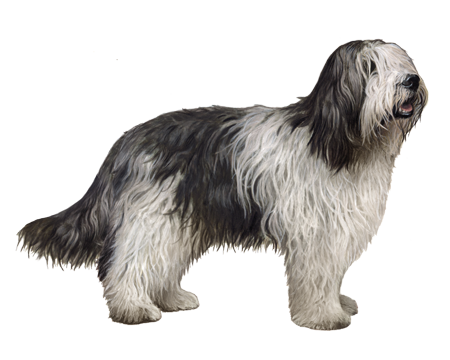
Pumi
The Pumi is an energetic working dog with plenty of stamina. Bred to herd and get the job done, these distinct-looking dogs love a job, even if that “job” is a game of fetch.
Interested in discovering if your dog is a Pumi?
Check out Wisdom Panel's DNA tests.

Pumi Traits
General Appearance
The Pumi is a medium-sized dog with almost square proportions and a curly coat. These dogs are alert, agile, and energetic, and move with a light gait.
Coat and Colouring
Pumik are known for their distinctive curls. Their coats consist of wavy and curly hair that forms corkscrews—but never cords—over their entire bodies.
Their hair, made of a mixture of harsh hair and softer undercoat, stands out from the body and grows up to three inches long. Pumik have longer hair on the undersides of their tails and short hair around their eyes.
Pumik come in three colors: black, white, or shades of gray. An intermixture of gray, black, or white hairs is acceptable under the breed standard provided they still have an overall appearance of a solid coat. The Pumi breed standard doesn’t allow for multiple color patterns or patches.
Distinctive Physical Traits
Pumik have lean, tight bodies with hard—but not bulging—muscles, straight backs, and deep, narrow chests. They have short, strong loins; and muscular hindquarters. These dogs also have strong, tapered muzzles, high set, medium-sized ears that are two-thirds erect, and dark brown, deep-set, oval eyes.
Pumi Temperament
Pumik are known for taking time to assess new situations—and these alert dogs are always on the lookout for new and unfamiliar things. The breed can be aloof with strangers and tend to bark often, making them great watchdogs but not great candidates for apartment life.
Pumik retain their working dog roots—bold, lively, and ready for duty. In the absence of work, Pumik might make it their job to herd other animals or children, or turn the living room into an agility course. It's a high energy breed that will do well in an active, engaged home.


Pumi History
The Pumi is one of three herding dogs native to Hungary. Pumik (the plural of Pumi) might be a cross between the Puli and Western European herding dogs and terriers.
Once considered a regional variant of the Puli, the Pumi is now considered a distinct breed. Today, it’s one of the most popular Hungarian herding dogs in Finland.
Pumi Care
Nutrition
Feed Pumik a high-quality dog food that is appropriate for their life stage (puppy, adult, senior). Consider a diet formulated for active breeds. Portion out their food with a measuring cup and limit treats to no more than 10 percent of their daily calories to avoid overfeeding.
Grooming
Though their corkscrew curls are natural, it takes effort to keep them looking good. Pumik coats are a mix of soft and harsh hair that must be combed out every three to six weeks, followed by a bath (or good soaking) to bring back the curls.
A professional groomer can trim the curly coats to keep them looking neat. After a bath, let Pumik dry naturally to allow their trademark curls to form.
Pumik also require regular ear cleanings, nail trims, and a dental care routine that includes at-home teeth brushing and professional cleanings.
Exercise
Pumik are energetic working dogs that require regular exercise. In addition to brisk walks, take these agile dogs hiking or to the dog park to run out their energy.
Pumik love fetch and other games and do well in dog sports such as agility, obedience, rally, and flyball. Mental stimulation is important, too; games and puzzle toys can help keep their minds engaged and prevent boredom.
Training
Pumik are smart and energetic, which helps them take easily to training. Focus on positive reinforcement and rewards-based training to help Pumik develop good manners (and keep their barking in check).
Socialization is also important to help Pumik feel more comfortable with strangers.

Pumi Genetic Health Conditions
-
Primary Lens Luxation
Primary Lens Luxation (PLL) is a condition that can cause the lens of the eye to become loose and eventually displace. The disorder is caused by degeneration of the fibers that hold the lens in place.
Knowing if your Pumi is a carrier or at-risk for these conditions can help you and your veterinarian plan for your pup's lifelong care. With Wisdom Panel™ Premium, you can get results for over 200 genetic health tests.
Breed Group
Herding
The herding group is a diverse category. These highly intelligent breeds were developed to guard and control the movement of livestock.
Resources
https://www.akc.org/dog-breeds/pumi/
http://images.akc.org/pdf/breeds/standards/Pumi.pdf
Reviewed 26 July 2020 by Laura Inman, DVM























































